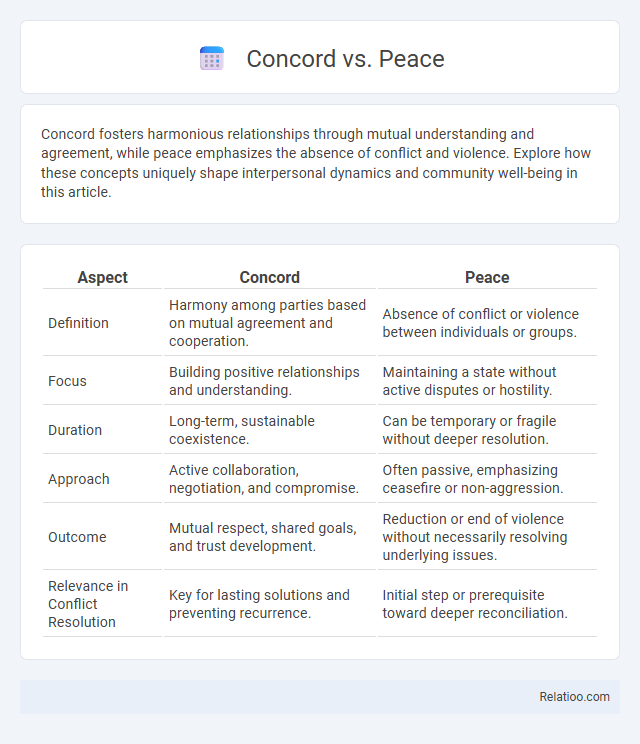Concord fosters harmonious relationships through mutual understanding and agreement, while peace emphasizes the absence of conflict and violence. Explore how these concepts uniquely shape interpersonal dynamics and community well-being in this article.
Table of Comparison
| Aspect | Concord | Peace |
|---|---|---|
| Definition | Harmony among parties based on mutual agreement and cooperation. | Absence of conflict or violence between individuals or groups. |
| Focus | Building positive relationships and understanding. | Maintaining a state without active disputes or hostility. |
| Duration | Long-term, sustainable coexistence. | Can be temporary or fragile without deeper resolution. |
| Approach | Active collaboration, negotiation, and compromise. | Often passive, emphasizing ceasefire or non-aggression. |
| Outcome | Mutual respect, shared goals, and trust development. | Reduction or end of violence without necessarily resolving underlying issues. |
| Relevance in Conflict Resolution | Key for lasting solutions and preventing recurrence. | Initial step or prerequisite toward deeper reconciliation. |
Defining Concord and Peace
Concord signifies a state of agreement and harmony between parties, emphasizing mutual understanding and cooperation, while peace primarily refers to the absence of conflict and violence. Your relationships thrive when concord fosters collaboration, going beyond mere peace as the cessation of hostilities. Establishing concord ensures lasting harmony, making peace more meaningful and sustainable.
Historical Perspectives on Concord and Peace
Concord historically signifies a formal agreement or harmony between conflicting parties, often reached after prolonged negotiations or conflicts, while peace represents the broader state of tranquility and absence of war or hostility. Your understanding of Concord emphasizes specific treaties or accords that mark turning points in resolving disputes, such as the Concordat agreements in European history. Peace encompasses the ongoing societal conditions and diplomatic efforts that sustain long-term stability beyond singular agreements.
Key Differences Between Concord and Peace
Concord refers to a state of agreement or harmony, often emphasizing mutual consent and alignment among parties, while peace denotes the absence of conflict or violence, focusing on tranquility and stability. Unlike peace, which can be a passive condition resulting from a ceasefire or lack of hostilities, concord implies active collaboration and shared understanding. The key difference lies in concord being an active agreement fostering cooperation, whereas peace represents a broader, often passive, state of calm and non-violence.
The Role of Concord in Societal Harmony
Concord plays a critical role in societal harmony by fostering mutual understanding, cooperation, and collective well-being among diverse groups. Unlike peace, which denotes the absence of conflict, concord emphasizes active agreement and unity in values, goals, and social practices. This deep alignment reduces tensions and creates a foundation for sustainable coexistence and collaborative progress within communities.
Peace: Beyond the Absence of Conflict
Peace represents a dynamic state of harmony and wellbeing, extending beyond the mere absence of conflict to encompass social justice, mutual respect, and sustainable development. Unlike concord, which emphasizes agreement and harmony in opinions or actions, and consensus, which denotes collective decision-making, peace integrates emotional, cultural, and structural dimensions fostering long-term societal stability. The concept of peace involves active efforts in reconciliation, conflict resolution, and building inclusive communities that address underlying causes of discord.
Psychological Foundations of Concord and Peace
Concord and peace both rest on psychological foundations of trust, empathy, and mutual respect, which facilitate harmonious relationships and conflict resolution. Concord emphasizes internal psychological alignment and collective agreement, fostering cohesion and shared understanding among individuals or groups. Peace extends these foundations by incorporating sustained emotional regulation and conflict transformation, enabling stability and the prevention of future hostilities.
Concord in Political and Social Systems
Concord in political and social systems refers to a state of agreement and harmony among diverse groups, enabling cooperative governance and societal stability. Unlike mere peace, which implies the absence of conflict, concord emphasizes active collaboration and mutual understanding to address underlying social and political issues. Achieving concord strengthens democratic institutions by fostering inclusive dialogue, collective decision-making, and social cohesion within multifaceted communities.
Achieving and Sustaining Peace
Achieving and sustaining peace involves addressing root causes of conflict through dialogue, mutual respect, and inclusive governance. Concord fosters unity and understanding among diverse groups, creating a stable foundation for long-term peace. Peace is maintained by continuous efforts in reconciliation, economic development, and the protection of human rights to prevent relapse into violence.
Real-World Examples: Concord vs Peace
Concord and peace both signify harmony but manifest differently in real-world contexts; concord often refers to formal agreements or treaties like the Concord Pact in Rwanda, which resolved ethnic conflicts, whereas peace represents a broader state of societal calm seen after the end of the Korean War armistice. You might observe that concord emphasizes negotiated settlements and legal frameworks, while peace embodies ongoing societal stability and reconciliation as exemplified by the lasting tranquility in post-WWII Europe. Understanding these distinctions helps clarify how collaborative accords promote concord, ultimately facilitating sustained peace.
Building a Future Embracing Both Concord and Peace
Building a future embracing both concord and peace requires fostering mutual understanding and collaboration across diverse communities. Emphasizing concord promotes harmonious relationships through shared values, while peace ensures the absence of conflict and the presence of justice and security. Integrating concord's proactive unity with peace's stability establishes a sustainable foundation for societal growth and global development.

Infographic: Concord vs Peace
 relatioo.com
relatioo.com